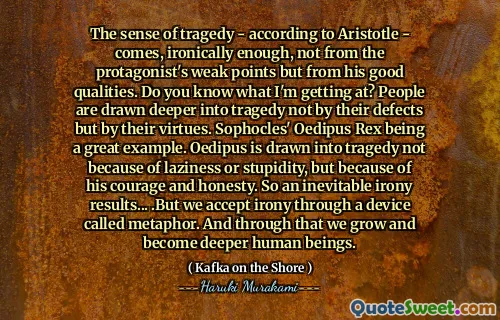Narrow minds devoid of imagination. Intolerance, theories cut off from reality, empty terminology, usurped ideals, inflexible systems. Those are the things that really frighten me. What I absolutely fear and loathe. Of course it's important to know what's right and what's wrong. Individual errors in judgment can usually be corrected. As long as you have the courage to admit mistakes, things can be turned around. But intolerant, narrow minds with no imagination are like parasites that transform the host, change form, and continue to thrive. They're a lost cause, and I don't want anyone like that coming in here.
In Haruki Murakami's "Kafka on the Shore," the protagonist expresses a deep fear of narrow-mindedness and a lack of imagination. Such traits are described as frightening and detrimental, as they disconnect people from reality and lead to rigid systems and empty ideals. The author emphasizes the danger posed by individuals who cannot adapt or grow, viewing them as parasitic entities that drain creativity and vitality from their surroundings.
Moreover, the text highlights the importance of self-awareness and the ability to acknowledge one’s mistakes. While individual errors can often be rectified, the author's disdain for intolerant minds suggests that those who lack imagination and flexibility are beyond help. In this context, Murakami conveys a sense of urgency in striving for open-mindedness, indicating that welcoming a narrow-minded perspective is unacceptable in any community or environment.






